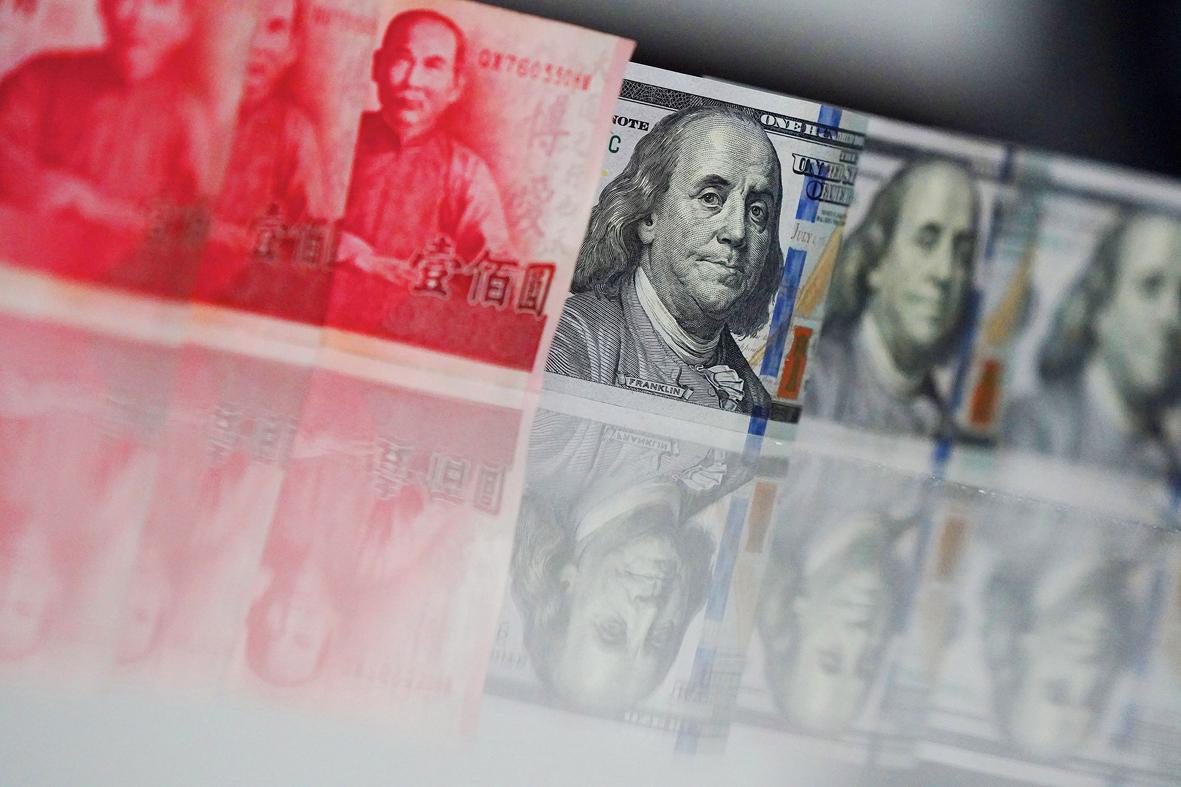The central bank has again warned of speculation by foreign institutional investors in the local foreign-exchange market, as it would further raise the value of the New Taiwan dollar against the US dollar.
In the past few sessions, foreign institutional investors have seemed keen to buy reverse exchange-traded funds (ETFs), which bet on the local equity market declining, as a way to reduce possible losses if the spot equity market moves lower, the central bank said.
In Taiwan, investors have to use NT dollar-denominated funds to buy ETFs, so foreign institutional investors have been remitting large amounts of US dollars and converting their funds into the local currency, boosting it.

Photo: CNA
However, foreign institutional investors could instead buy short position futures contracts as a hedging measure, placing a fraction of their foreign currency-denominated deposits in the futures contracts, the central bank said.
That way, they would only need to move a small amount of funds into Taiwan, which would not send ripples through the local forex market, it said.
The central bank said it suspected that foreign institutional investors were speculating in the local foreign exchange market by buying reversal ETFs rather than short-position equity futures contracts.
When the NT dollar rises further, these foreign institutional investors would simply sell their reversal ETFs and convert their funds into US dollars, which would allow them to receive more of the greenback, the central bank said.
Moreover, foreign institutional investors are likely to post additional gains in the equity market through their reversal ETFs when share prices fall, it added.
The NT dollar has moved higher against the US dollar in recent sessions. As of Friday, the NT dollar had risen more than 4 percent against the greenback this year, closing at NT$28.876.
When foreign institutional investors remit funds for investments in Taiwan, they have to invest up to 30 percent of their funds in financial instruments with a fixed income, such as bonds, and must place the remainder in the equity market as soon as possible.
By investing in reversal ETFs, they can get around the 30 percent ceiling imposed by financial authorities, the central bank said.
Foreign institutional investors had bought NT$48 billion (US$1.66 billion) worth of reversal ETFs as of the end of last month, it added.
The central bank said that it is determined to maintain market order and stabilize the local financial market, adding that it would meet with the Financial Supervisory Commission to create measures to solve the large purchases of reversal ETFs by foreign institutional investors.

Among the rows of vibrators, rubber torsos and leather harnesses at a Chinese sex toys exhibition in Shanghai this weekend, the beginnings of an artificial intelligence (AI)-driven shift in the industry quietly pulsed. China manufactures about 70 percent of the world’s sex toys, most of it the “hardware” on display at the fair — whether that be technicolor tentacled dildos or hyper-realistic personalized silicone dolls. Yet smart toys have been rising in popularity for some time. Many major European and US brands already offer tech-enhanced products that can enable long-distance love, monitor well-being and even bring people one step closer to

Malaysia’s leader yesterday announced plans to build a massive semiconductor design park, aiming to boost the Southeast Asian nation’s role in the global chip industry. A prominent player in the semiconductor industry for decades, Malaysia accounts for an estimated 13 percent of global back-end manufacturing, according to German tech giant Bosch. Now it wants to go beyond production and emerge as a chip design powerhouse too, Malaysian Prime Minister Anwar Ibrahim said. “I am pleased to announce the largest IC (integrated circuit) Design Park in Southeast Asia, that will house world-class anchor tenants and collaborate with global companies such as Arm [Holdings PLC],”

TRANSFORMATION: Taiwan is now home to the largest Google hardware research and development center outside of the US, thanks to the nation’s economic policies President Tsai Ing-wen (蔡英文) yesterday attended an event marking the opening of Google’s second hardware research and development (R&D) office in Taiwan, which was held at New Taipei City’s Banciao District (板橋). This signals Taiwan’s transformation into the world’s largest Google hardware research and development center outside of the US, validating the nation’s economic policy in the past eight years, she said. The “five plus two” innovative industries policy, “six core strategic industries” initiative and infrastructure projects have grown the national industry and established resilient supply chains that withstood the COVID-19 pandemic, Tsai said. Taiwan has improved investment conditions of the domestic economy

Sales in the retail, and food and beverage sectors last month continued to rise, increasing 0.7 percent and 13.6 percent respectively from a year earlier, setting record highs for the month of March, the Ministry of Economic Affairs said yesterday. Sales in the wholesale sector also grew last month by 4.6 annually, mainly due to the business opportunities for emerging applications related to artificial intelligence (AI) and high-performance computing technologies, the ministry said in a report. The ministry forecast that retail, and food and beverage sales this month would retain their growth momentum as the former would benefit from Tomb Sweeping Day